Prometheus: Titan of Fire and Sacrifice
Reading Time: 10 min
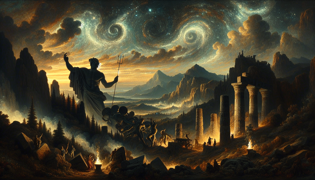
About Story: Prometheus: Titan of Fire and Sacrifice is a Myth from greece set in the Ancient. This Poetic tale explores themes of Perseverance and is suitable for All Ages. It offers Inspirational insights. A Titan dares to steal the flame from Olympus, gifting humanity with fire at the cost of his own freedom.
Introduction
On the jagged flank of Mount Olympus, the air trembled with divine edict. Clouds knotted like sheep’s fleece around marble spires, while distant thunder cried as if Zeus himself muttered curses. Prometheus stood aloof, bronze skin gleaming in lamplight, his gaze salted with compassion for mortals. He was a Titan outcast, yet his spirit burned fiercer than any forge. The gods had cast him down for daring to pity humanity, but pity had become his fiercest ally. By Zeus’s beard, he swore that no mortal would remain shrouded in eternal darkness.
Beneath him lay a world of fragile souls, huddled in caves and fending off cold nights with trembling wishes. Their roofs were thatch and clay, their hopes as fragile as a moth’s whisper. Prometheus remembered his own forging in the crucible of Titandom, how purpose took shape within him like steel on an anvil. He knew that fire was more than flame. It was freedom, progress and communion—a spark to lift hearts from mere survival to soaring invention. Somewhere below, children dreamt of warmth and elders longed for meals that did not taste of ash.
Smoke-scent lingered like an unwelcome guest, twisting around Prometheus’s cloak as he studied the gods’ workshop. His fingertips grazed the rough-hewn stone, cold to the touch yet alive with ancient echoes. A distant roll of thunder grumbled like a discontented monarch. Starlight painted his silhouette in silver, casting long shadows that danced like cunning foxes at his feet. He inhaled the tang of molten metal and listened to the rhythmic hammering of Hephaestus’s forge in the distance. It was within that furnace, guarded by divine decree, that the most potent gift awaited its thief.
The Spark of Rebellion
Prometheus paced the marble causeway that bordered the gods’ sanctum, each footstep echoing like a lonely drumbeat. He recalled how children’s faces lit with awe when they glimpsed a flicker of torchlight, how elders spoke of its warmth as though it were nectar from Olympus. Yet mortals remained fearful of its raw power, convinced that fire was simply destruction in disguise. He sighed, remembering his own forging alongside the elder Titans, where duty was hammered into flesh and mind alike, as inevitable as iron meeting anvil. His defiance blossomed like a dark rose at the insight of those cave‑dwelling souls.
A chill wind snaked through colonnades, carrying the scent of laurel and damp stone. Prometheus paused, pressing a hand to a column carved in intricate relief: scenes of gods feasting, mortals bowing, and Prometheus himself offering gifts once. Those carvings were now cracked, chipped by divine wrath. He bent low, whispering an oath as old as the first breath of time: he would steal fire from the gods themselves. As sure as Hades claimed the underworld, he would give humankind this spark.
He took leave of Olympus under the pale eye of Selene, wandering through shadowed corridors lit only by torches too feeble to chase away his thoughts. He recalled countless nights spent pondering mortals’ plight, their teeth chattering like rattled bones against the cold. In one cavern below, a mother had shielded her child from frost with trembling hands. In another, a carpenter’s half‑finished cradle lay abandoned for lack of warmth to cure the wood. Such scenes drove every pulse of his mighty heart.
At last he reached the forge of Hephaestus, where molten metal hissed against water and sparks flew like dancing fireflies. The air tasted of sweat and flame, clinging to Prometheus’s throat with insistence. He gathered himself, vision sharpening as though a blacksmith’s hammer had struck his resolve into shape. Above him, the forge’s roaring flames beckoned like an insolent mistress, daring him to defy the order of gods. The Titan inhaled deeply, feeling the heat seep into his bones, and prepared to seize the gift of light for all humanity.
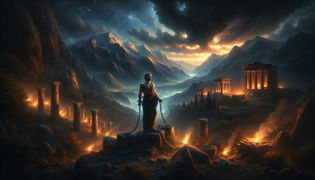
The Theft of Fire
Under the rumble of an angry sky, Prometheus crept toward Hephaestus’s molten cauldrons, each bubbling brimstone a siren’s call. The walls of the forge bore the residue of a thousand creations—tools of war, gleaming armour and statues that seemed to breathe. Each spark that escaped the cauldrons was a promise of what fire could bestow: warmth, protection, art. He recalled the morrow when mortals first lit these flames, skin warmed by light, eyes reflecting amber hope.
A drop of molten metal hissed against a cooling slab, sending a gout of steam swirling like a phantom dancer. The heat was suffocating, yet Prometheus pressed forward, his cloak a shield against the furnace’s ardour. He grasped a charred branch from a nearby rack—an igniter left unattended—and held it close to the roaring fire. Instantly, the wood crackled and flared, a jealous mistress awakening at a lover’s touch. The flame climbed his cloak as if testing the mettle of its bearer, then settled into steady brilliance.
In that moment, time stilled. Smoke coiled around his silhouette, heavy with the tang of charred resin and iron. He felt the rough grain of the branch in his fist, its heat licking at his skin like a warning. Yet his heart thundered with triumph. By the bolt of lightning that cleft the world, he had secured the blaze that would alter destiny. He threaded deeper into the halls, the stolen fire nestled in a hollow of his cloak, its glow pulsing in tandem with his breath.
He paused at a portico, listening for the hammer’s echo. A servant of Hephaestus slumbered nearby, muffled snores punctuating the forge’s roar. A fine bead of sweat slid down Prometheus’s brow, mingling with the heat and dust. He slipped past, travelling the serpentine corridors until Olympus itself lay far behind him. Outside, starlight shivered upon ancient ruins, and a cool breeze carried the fragrance of olive groves. He had done the unthinkable: plundered the very essence of divine power. Now the gift belonged to mortals, and nothing would ever remain the same.
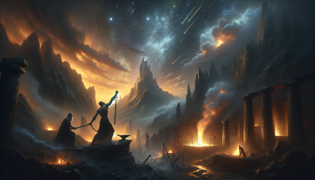
The Gift to Humankind
Prometheus emerged beneath a vault of indifferent stars, the stolen fire cradled in his cloak like a living spirit. The night air carried the faint sweet scent of olives and thyme, mingling with the acrid waft of smoke that trailed him like a shadow. He set foot upon mortal soil with trepidation; each step stirred the dust of villages whose hearths lay cold and bleak. He thought of the trembling hands that would soon clasp this flame and feel its promise of warmth, of fellowship, of possibility.
He looked upon a settlement carved into a gentle slope, where thatched huts huddled like frightened creatures. The people stirred, drawn by a faint glow that pierced the gloom. A young couple crept from their hovel, eyes widening at the living flame before them. It danced like a playful nymph, casting long, leaping shadows upon rough timber walls. Children crowded forward, noses twitching at its warmth, as though greeting an old friend. The elders stared in awe, hashing out myths to make sense of this gift that smelled of cedar and brimstone.
Within hours, the fire had wrought miracles. Mortals roasted game beneath its glow, the meat crackling with new flavour rather than tasting of embers. Families gathered in circles, sharing stories that rose in volume like birds at dawn. Craftsmen scorched clay with controlled heat, producing pottery that gleamed with smooth lustre. Iron ore softened beneath embers borrowed from divine will, tools fashioned to build shelters that would outlast generations. The flame had become a teacher, imparting knowledge as gently as a mother’s lullaby.
All night, the fire burned steadily, its golden pulse guiding hearts from superstition toward industry. Prometheus watched from a rocky outcrop, tears glinting like dew in his eyes. He smelled roasted barley and honeyed wine, heard the murmur of voices knitting a new civilisation. His sacrifice already bore fruit; the philosophy of light had taken root. By dawn, smoke spiraled above every hut, and hope settled into each soul. In that moment, the Titan felt a surge of triumph and dread entwined: triumph for his success, dread for the wrath he had unleashed.
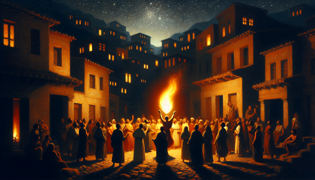
The Chains of Consequence
Zeus learned of the stolen flame as lightning split the heavens, its roar echoing like a cosmic drum of fury. From his throne he thundered: no mortal or Titan could rob the gods of their prerogative with impunity. Prometheus felt the sky tremble as Olympian decrees shook the very earth. Mortals heeded the thunderbolt, eyes awash with newfound confidence, but the gods prepared a darker lesson.
Ere the sun rose, Zeus had summoned his wrath. Prometheus was seized in the groves of Oceanus, where silver streams ran cold and quiet. He was bound with adamantine chains that bit into his flesh as though alive. Each link gleamed with the reflected anger of Olympus, heavy as a mountain’s grief. A pitch‑black eagle was set to feed upon his liver, whose tissue would regrow each dawn, ensuring eternal torment. The echo of metal against flesh rang out like a dirge through the hills.
On the windswept crag where he hung, Prometheus remained unbroken. His bronze skin was slick with tears and dew, each drop shimmering like a fallen star. The eagle’s screech rent the dawn, talons raking his side, but his eyes remained fixed upon the horizon. He thought of the villages basking in firelight, of children’s laughter warming the air as spring sun coaxes blossoms from winter’s grasp. In his agony, he drew solace from their progress.
Pain blazed within him as fiercely as any flame he had stolen, yet he endured. His spirit was as unyielding as oak, roots entwined with purpose. Each dawn he welcomed the eagle’s return, each evening he reflected on the gift he had given. Punishment and deliverance danced together in an unholy ballet, yet he would not recant. Mortals learned to tame fire without fear, forging empires that echoed his sacrifice. His suffering became legend, his perseverance a beacon. Even chained, he remained a champion of humankind’s ascent.
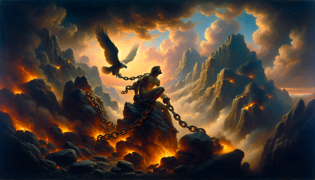
Conclusion
Centuries have passed since that fateful defiance, yet the echo of Prometheus’s sacrifice still burns in mortal memory. Campfires and hearths across the world trace their lineage to the Titan’s stolen flame, each ember a testament to his unyielding courage. Poets invoke his name when praising perseverance, and artists depict his bound form as a symbol of unbroken resolve. His torment atop that windswept crag became a parable whispered by ancients and scholars alike, reminding all that progress often demands profound sacrifice.
In every forge’s glow and oven’s warmth, there lies a fragment of his heart, beating in sync with humankind’s collective ambition. As fleeting as a moth’s whisper, his act of rebellion reverberated through millennia, forging paths from caves to cities of marble and spire. Each time a candle is lit to dispel darkness, Prometheus rides upon its flicker, guiding mortals toward greater enlightenment. His wounds, though unseen, pulse with every kindled flame that warms a child’s cheek or cooks the humble loaf shared among friends.
Though bound by chains and tormented by an unending eagle, his spirit remains unbroken. Eternally he watches the world he ignited, daring each generation to reach beyond fear. May his example burn bright in our souls, urging us to champion knowledge, to endure hardship, and to share the light with those who wander in shadow. In his defiance dwells the promise that even the mightiest decree can be upended by a single spark of hope.

















